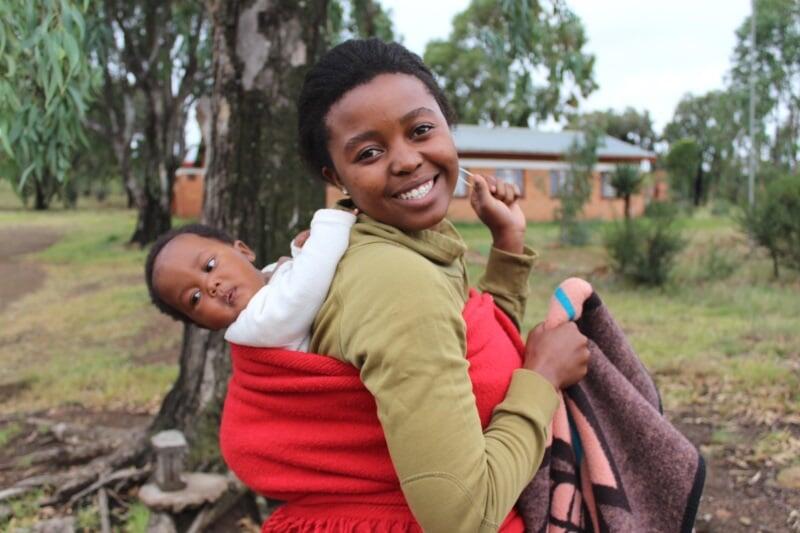QACHA’S NEK, Lesotho – The meandering roads that permeate the Maluti Mountains in Qacha’s Nek, about 340 kilometres from the capital, Maseru, lead to the remotest areas. Here, the enumerators helping to conduct Lesotho’s 2016 Population and Housing Census were often required to walk long distances to reach each and every household – at times, in hard rain and plummeting temperatures.
At one point, Nyefolo Letlala, the Census Assistant Supervisor for Qacha’s Nek, walked for four hours to reach a village that was inaccessible by vehicle. And hers was no isolated experience: many enumerators walked long distances over difficult terrain to reach villages that were sparsely situated.
To reach homesteads on the other side of Lesotho’s biggest watercourse, Senqu River, boats were used. To access villages where no roads existed, in particular the district’s cattle posts, the only mode of transport available was horseback.

Enumeration in hospital
Not even institutions such as Tebellong hospital in Qacha’s Nek were exempt from enumeration. Yet access to the hospital, located in an enclave on the banks of the Senqu River, posed a challenge as the river at this point stretches more than 50 metres wide – and there is no bridge to cross it.
Nor is the challenge surmounted once the river has been crossed: one still has to ascend a mountain, which takes about 30 minutes by car, despite a distance of only five kilometres.
The hospital’s Manager of Nursing Services, Nomathemba Bhuqwana, concedes that the river and mountain present a major challenge for sick people, including pregnant women needing to access emergency medical services.
“Sometimes women end up giving birth on the other side of the river, while waiting for daybreak to get a boat across. The road is also not in good condition, so you can imagine (what it is like for) sick people travelling in those conditions, especially pregnant women having to be assisted across the river.”
El Niño-induced drought

In addition, they are beginning to see cases of malnutrition at the hospital due to an El Niño-induced drought that has hit Lesotho hard. “Normally, at this time of the year, there is plenty of food such as maize but this year there is hardly anything for people to eat as they depend mostly on agricultural produce,” she says.
The barren fields and failed crops are sorely evident as one traverses the country.
Food shortages and malnutrition no doubt impact another of the country’s major challenges – that of child marriage. Girls as young as 15 years old are being married off in the area, leading to health risks, according to Ms. Bhuqwana. “They themselves produce children too early and end up with cephalopelvic disproportion,” she says.
What particular worries her is the high number of cases of HIV, based on the fact that the majority of women who undergo pre-natal clinic testing are found to be HIV-positive.
“We suspect poverty also has a role to play here, as most men from the area have migrated to Durban in South Africa (for work purposes), and they attract a lot of women when they return.” To remedy this situation, there is a need for education on preventing HIV transmission, particularly for the youth and men, she says.
Young statisticians observe census

A group of young statisticians from four African countries (the Democratic Republic of the Congo, Ethiopia, Lesotho and South Africa) participated in and observed the census process, with support from UNFPA.
“The future of Africa is in our hands, as young people. We are grateful to UNFPA and the Bureau of Statistics (BOS) for this opportunity,” says Paul Tambwe Nawez, a young statistician from the DRC.
They visited a number of districts where they identified some of the challenges experienced by the enumerators, such as having to walk long distances and access some remote areas on horseback, the lack of electricity, and the failure of power banks, which were needed for the hand-held devices used by the enumerators. In one of the remotest areas, at Mant’sonyane, they observed the Census Coordinator collecting the enumerators’ tablets each evening in order to charge them and return them in time for the next day’s use.
UNFPA provides technical assistance
The importance of the young statisticians’ participation in the region’s first digital census using hand-held mobile devices (android tablets) was stressed by Dr. Mady Biaye, UNFPA Technical Advisor on Population Data and Data for Development Policy.
“We wanted to make sure that we groom expertise in the area by ensuring the participation of young statisticians from around Africa,” he says. Lesotho is the first African country to use hand-held devices in a census and the first to use them in the United Nations 2020 Round of Censuses.
Dr. Biaye congratulated the Government of Lesotho for its decision to use mobile devices for full implementation of the census. “I have seen enumerators in Lesotho working passionately and I am confident we will have a very successful digital census,” he says.
Government of Lesotho applauded
UNFPA’s Representative to Lesotho, Therese Zeba Kobeane, applauded the Government of Lesotho and the Bureau of Statistics for conducting a successful census.
Due to the Government’s timely allocation of funds for the census the Bureau of Statistics was able to conduct the process on schedule, she says. The authorities – from national to local level – were all involved and supported the process.
“We are confident, therefore, that we will have credible results, which will be useful in the country’s planning and design of sectoral policies and strategies, and monitoring and evaluation,” she says.
“The census came at the right time, following approval of the Sustainable Development Goals (SDGs) and also when the country is preparing to review its National Strategic Development Plan and sectoral strategies, as it will provide an accurate and updated baseline.”
UNFPA is the lead United Nations agency with a mandate to support data gathering at country level.
By Violet Maraisane


